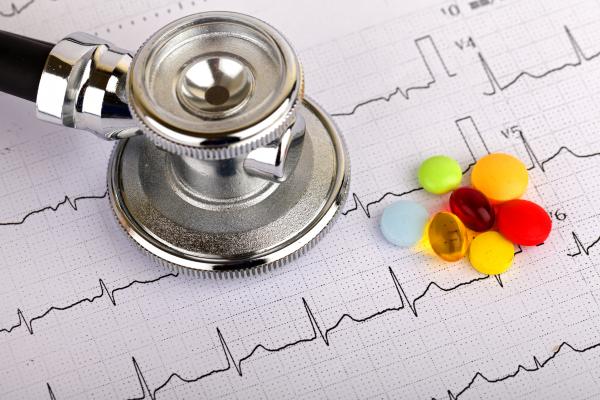Press release
In patients with device-detected atrial fibrillation and a high comorbidity burden, oral anticoagulation increases bleeding without a clear reduction in stroke. This is the main finding of a sub-analysis of the NOAH – AFNET 6 trial presented by Dr Julius Nikorowitsch, University Medical Center Hamburg-Eppendorf (UKE), Hamburg, Germany, in a late-breaking science session at the annual congress of the European Heart Rhythm Association (EHRA) in Berlin, Germany, today and simultaneously published in the European Heart Journal (1).
Device-detected atrial fibrillation (DDAF) are short and typically rare episodes of atrial fibrillation (AF) detected by pacemakers, defibrillators, and implanted loop recorders capable of continuous rhythm monitoring. Device-detected atrial fibrillation is found in every fifth patient with a cardiac implanted electronic device (2). Device-detected atrial fibrillation can lead to stroke, but the stroke risk in patients with device-detected atrial fibrillation appears lower than the stroke risk in patients with ECG-documented atrial fibrillation.
Recently, the NOAH – AFNET 6 (Non vitamin K antagonist Oral anticoagulants in patients with Atrial High-rate episodes) trial found that anticoagulation expectedly increases bleeding events in patients with device-detected atrial fibrillation while the stroke preventing effect was smaller than expected (3). This even applies to patients with long episodes of device-detected AF (4). A meta-analysis of NOAH – AFNET 6 confirmed an increase in bleeding and detected a small reduction in ischemic strokes with anticoagulation (5).
Dr Nikorowitsch explained: ”Older age, female sex, kidney disease, diabetes, heart failure, and other comorbidities increase the risk of adverse cardiovascular outcomes. We were interested if oral anticoagulation might reduce cardiovascular event rates in patients with a high burden of these factors and device-detected AF. To address this, we performed a prespecified secondary analysis of the NOAH – AFNET 6 data set.”
NOAH – AFNET 6 randomized 741 elderly patients (mean age 79 years, 52% women) with device-detected AF and multiple comorbidities (CHA2DS2-VASc >4) into two cohorts: one receiving anticoagulation with edoxaban, the other without anticoagulation. This patient population was outside of the approved indication of edoxaban. The stroke rate was low without anticoagulation (1.3%/year). Anticoagulation did not considerably reduce thrombo-embolic events, but increased bleeding and death in this patient group. Older age, diabetes, and kidney disease independently predicted the primary outcome defined as a composite of stroke, systemic embolism, or cardiovascular death. Anticoagulation, age, heart failure, diabetes, prior stroke, and kidney disease predicted safety outcome defined as major bleeding event or death.
Prof. Paulus Kirchhof, UKE, principal investigator of the NOAH – AFNET 6 trial, concluded: “The findings are consistent with the main trial: The stroke rate in patients with device-detected AF is low, even with multiple comorbidities. Anticoagulation had only a minor effect on stroke and systemic embolism. Our results, together with other data and considering the limitations of all subgroup analyses, can help to adapt the safe and effective use of oral anticoagulants in patients with device-detected AF and multiple stroke risk factors in clinical practice, and in future guidelines. They also call for new methods to identify patients with device-detected AF at high risk of stroke which might benefit from anticoagulation.”
References
(1) Lip YH, Nikorowitsch J, Sehner S et al. Oral anticoagulation in device-detected atrial fibrillation: effects of age, sex, cardiovascular comorbidities, and kidney function on outcomes in the NOAH-AFNET 6 trial. Eur Heart J. 2024 April 9. DOI: 10.1093/eurheartj/ehae225
(2) Toennis T, Bertaglia E, Brandes A, et al. The influence of Atrial High Rate Episodes on Stroke and Cardiovascular Death - An update. Europace. 2023 Jul 4;25(7). DOI: 10.1093/europace/euad166.
(3) Kirchhof P, Toennis T, Goette A, et al. Anticoagulation with Edoxaban in Patients with Atrial High-Rate Episodes. N Engl J Med 2023;389(13):1167-1179. DOI: 10.1056/NEJMoa2303062.
(4) Becher N, Toennis T, Bertaglia E, et al. Anticoagulation with edoxaban in patients with long Atrial High-Rate Episodes ≥24 hours. Eur Heart J. 2024 Mar 7;45(10):837-849. DOI: 10.1093/eurheartj/ehad771
(5) McIntyre WF, Benz AP, Becher N, et al. Direct Oral Anticoagulants for Stroke Prevention in Patients with Device-Detected Atrial Fibrillation: A Study-Level Meta-Analysis of the NOAH-AFNET 6 and ARTESiA Trials. Circulation. 2023. DOI: 10.1161/CIRCULATIONAHA.123.067512
About the Atrial Fibrillation NETwork (AFNET)
The Atrial Fibrillation NETwork is an interdisciplinary research network comprising scientists and physicians from hospitals and practices dedicated to improving the management of atrial fibrillation through coordinated research in Germany, Europe, and worldwide. Its main objective is to conduct high quality investigator-initiated clinical trials and registries on a national and international level as well as translational research projects. The AFNET continues the long-term activities of the network which has been funded by the German Federal Ministry of Research and Education over a decade. Since January 2015, specific projects and infrastructures of the AFNET are funded by the German Centre for Cardiovascular Research (DZHK), and some projects by EU research grants. AFNET has long expertise in the management of atrial fibrillation, but also provides support for work in other fields informing cardiovascular care. The results of 20 years of clinical and translational research improved the lives of patients with cardiovascular diseases and influenced treatment guidelines.
www.kompetenznetz-vorhofflimmern.de
Funding of the NOAH trial: AFNET, DZHK, Daiichi Sankyo
NOAH registration: NCT 02618577, ISRCTN 17309850
Press Contact
Angelika Leute, PhD
Phone: +49 202 2623395
a.leute@t-online.de



